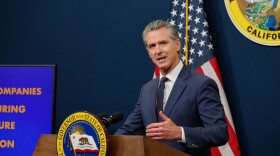The revolution in Egypt has a different flavor in Alexandria, the historic port city on the Nile delta.
For 2,000 years, the city was a haven for people from around the Mediterranean and beyond — a center for intellectual life that first defined the word "cosmopolitan."
The city's minorities fell on hard times during the last century, when the policies of Egyptian nationalist leader Gamal Abdel Nasser drove many foreign communities out, even those that had been established for centuries.
Now, the minority groups that remain, Christians, Nubians and members of the banned Muslim Brotherhood, are hoping that Egypt's transition will be a chance for them to reassert themselves.
Human-rights lawyer Alaa Setyan has spent much of his career defending minority members in police brutality cases.
He says he hopes his workload will be easier under a more democratic government, but adds: "I fear for the rights of all people, like the Muslim Brotherhood and Christians. I fear that they might be treated unfairly; I believe we are all the same people and everyone should have his right, whatever his way of thinking is, whatever his religion."
Historian Mohamed Awad notes that Alexander the Great founded this city as a multicultural meeting place, a tradition that carried on through the Roman and Islamic periods.
It was only after the military took power under Nasser in the 1950s that foreign communities were forced out.
Alexandria's Jewish and Greek communities — groups that had been part of Alexandrian life for centuries — gradually dwindled.
"We don't still have a multicultural society today, in Alexandria," Awad says, adding that much of the city's population now consists of Egyptians from rural areas who have come to find work.
Haggag Hassan Oddoul is a writer — born in Alexandria but a member of the Nubian community, dark-skinned Egyptians who were displaced from their homeland in Upper Egypt by the building of the High Dam at Aswan in the 1960s.
At a marble-topped table in one of the city's many smoky cafes, he laments the loss of Nubian culture, which combined elements from black Africa with ancient Egyptian religion, Christianity and Islam.
Oddoul says the Nubians are now a marginalized people, scattered across Egypt. "They keep us out of our land," he says, adding that much of the area that wasn't inundated by the dam has now been claimed by corrupt business cronies of ex-president Mubarak.
"We are sad because the world, they don't know about our case, they don't know. We ask all the people of the world, look at us. We are in trouble," he says.
Oddoul has written prize-winning novels, plays and short stories, as well as books advocating the Nubian cause. He is hoping the revolution will give Nubians a chance to make their case to their fellow Egyptians.
On Sunday, hundreds of Alexandria's Christians sent echoes through St. George's Coptic Orthodox Church with prayers, chanting and songs. They are among the city's oldest surviving minority communities.
They have suffered deadly attacks on their churches, including a bombing on New Year's Day that killed 23 worshipers and wounded nearly a hundred others.
The Rev. Macaney Makra says the Christians of Alexandria are concerned about the current situation, but he says they are resilient and well-integrated into the community. "We cannot look at the Christians as an isolated minority," he says, stressing that the group's minority status is only a matter of numbers.
The recent problems we've had show that there is a solidarity between Muslims and Christians, and I think that Egyptians are becoming more and more aware that they have to take their fate in their own hands.
But Makra acknowledges that Christians face problems with some fundamentalist Muslim groups.
"From the Muslims there are some liberals, there are some talking about community [beyond] religion and there is also this Islamic brotherhood. They are talking about a religious country," he says.
Subhii Saleh, a member of the Muslim Brotherhood, made an unsuccessful run for Parliament in the last election. He blames the bombing in January on agents of the Mubarak government, saying they wanted to sow division and fear between Muslims and Christians.
Saleh says brotherhood members are committed to Islamic principles of tolerance and protection for religious minorities. "The rights of minorities are sacred in Islam," he says, "and history will show that there have never been problems for minorities except when Islam is pushed away from the system of government."
Saleh says the Muslim Brotherhood wants a legitimate voice in a secular political process.
Historian Awad says Alexandria did, in fact, maintain its reputation for religious toleration through much of its Islamic history. It was a center for the moderate and mystically oriented Sufi school of Islam.
Now, Awad says, he's basically optimistic. He says Alexandrians saw a spirit of cooperation among minorities during the revolution.
"The recent problems we've had show that there is a solidarity between Muslims and Christians, and I think that Egyptians are becoming more and more aware that they have to take their fate in their own hands," he says.
Awad directs a research center at Alexandria's modern library, and he says he hopes that the revolution will be a chance for his city to regain its true character as a cosmopolitan intellectual hub.
Copyright 2022 NPR. To see more, visit https://www.npr.org. 9(MDAzMjM2NDYzMDEyMzc1Njk5NjAxNzY3OQ001))






